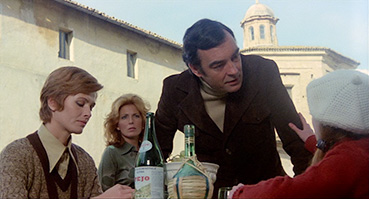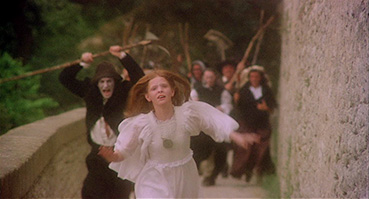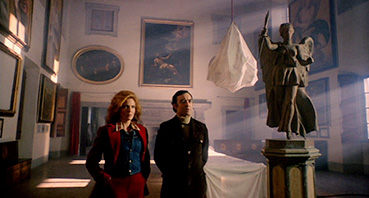|
Young Emily is still coming to terms with the trauma of seeing her mother plunge to her death as she fell from a burning window at their previous home. Possibly as a result, she keeps having nightmares set in medieval times in which she is chased through the streets by an angry mob. Her father Michael is a BBC documentary director and presenter whose latest film is an exploration of the myth of the Devil. Note the word myth. That's how Michael describes it. And while in the real world we're happy to accept that he's on the button, in horror themed movies we know that all bets are off. In the course of his research, he stumbles across a transparency that he's been mistakenly sent of an Italian painting that really catches his eye. It portrays a young girl being pursued by an angry mob in medieval times, their actions overseen by the Devil himself. Although unaware that this painting is an almost exact representation of the actions that are haunting his daughter's dreams, Michael is particularly drawn to the image of a falling woman on the left side of the picture. Want to guess why?
A trip to Italy and the historical town of Spoleto is thus on the cards so that Michael can continue filming and root out information on the original painting. With Emily's nightmares getting worse, her doctor advises him to take her along, and to ensure that she's looked after when he's busy elsewhere, he also invites her attentive nanny Julie to join them. Your licence fee is paying for all this, by the way. They're met at the airport by Rome-based American researcher Joanna, who takes them to their villa and then sets about tracking down the location of the painting. Michael quickly gets the hots for Joanna, which disappoints Julie, who also has a quiet but deeply felt thing for her boss. Ellie is also upset by the attention her father is attracting from this female interloper, and her anguish isn't helped by the continuation of dreams that appear to be set in this very location.

Night Child was one of a number of Italian genre films appeared in the wake of the phenomenal international success of The Exorcist, but if you go in expecting the pyrotechnics and sophistication of Friedkin's masterpiece, or even Alberto De Martino's lively Italian knock-off L'Antichristo, you'll likely be disappointed. And then some. Night Child trades on subtlety and ambiguity, so much so that there is a suspicion that Emily's issues may well be psychological rather than demonically inspired. There are plenty of hints that supernatural forces are at work, but they're little more than that, and most are delivered by Contessa Cappelli, the woman who inadvertently supplied Michael with the slide that brought him to Spoleto in the first place. A series of coincidences give her words some credence, but the film never comes out and confirms them either way, with the only event you could comfortably label supernatural – a dagger flies across the room of its own accord – being visited on the very woman dishing out these warnings.
As a psychological drama, Night Child is consistently interesting, occasionally quite eerie and visually stylishly (Emily's nightmares and Michael's night-time walks through the Spoleto streets are particularly impressive). What the film never becomes is exciting or scary. It doesn't help that its most potentially creepy image, a visual flaw in Michael's film footage that Joanna thinks might be ectoplasm, is a stubbornly inanimate white blob whose shape reminded me a little too much of Barney the Dinosaur.
Despite (probably) re-recording their dialogue in post-production, the lead performers do rather well, notably Richard Johnson as Michael and Joanna Cassidy as, erm, Joanna (even this early in her film career she still has the best female laugh in the business). And despite a few hesitant moments and the odd bit of "Can you do this like an adult?" direction from Massimo Dallamano, young Nicoletta Elmi does a most convincing job as Emily, particularly her tortured anguish and later demonic possession. If that's what it is, of course.

For the most part, The Night Child is not a horror movie at all but a psychological drama, one driven by mood and intrigue rather that plot complexity. Whether there's enough of the former to compensate for the lack of the latter will be a matter of opinion. Certainly, by the time we hit the final third the strain is starting to show, but things do rally round for a last act twist-reveal that has been re-employed since by a director of some note. I shall say no more. Whether it then needed the tragic-irony ending that follows is another matter, and concluding the film (this is not really a spoiler) by splashing the Italian word for "Why?" across the screen in that loud curvy manner employed by science fiction flicks of the 50s feels both peculiarly inappropriate and comically overdramatic.
The Night Child is going to have trouble getting a rep as an overlooked masterpiece, and despite being lumped in the post-Exorcist possession cycle, I'm not sure it actually belongs there. You'll need patience to get the best out of it, but it is well cast, often atmospheric, and seductively shot (director Dallamano was formerly a cinematographer whose credits include Leone's first two Dollars films), and there are some effectively creepy moments nestled in amongst the drama. And given that this is an Italian film taking an outsider's view of London, it's hard not to break into the widest of smiles when Michael tells his pipe-smoking BBC boss, "Yes, all my documentaries are boring, that's why I work here." Oh surely not...
Given that this release is a couple of years old and I've been spoiled in the meantime by some spiffy Blu-ray transfers of older horror works, I was a little apprehensive about revisiting this Arrow DVD. My notes assure me that it looked good back then, but how would it stand against some of the label's more recent releases? Rather well, as it happens. Framed 1.85:1 and anamorphically enhanced, the image crispness and detail is often hugely impressive for a standard definition transfer, and when the lighting is right the colours are vivid and reasonably naturalistic. Contrast is also well judged when the light levels allow (there is some loss of shadow detail to the solid black in the darker scenes) and there's hardly a dust spot to be seen. There is some slight flickering on the image for much of the time, but it's not distracting.

You have a choice of soundtracks between English and Italian with English subtitles, both Dolby mono 2.0 and both post-dubbed. With the two adult leads both native English speakers, the English track most accurately matches what their mouths are doing, but the Italian track is performed with a little more gusto. Both have some range restriction and some audible background crackle, but are otherwise in reasonable shape. For a couple of scenes that are missing from the English language version, the dialogue slips into subtitled Italian, whichever version you're watching.
Exorcism Italian Style (12:43)
A brief but useful look back at the post-Exorcist Italian possession horror cycle, with contributions from Contamination director Luigi Cozzi, Dracula 3D screenwriter Antonio Tentori and genre critic Paolo Zelati. A number of key films of this sub-genre are mentioned, including genre stalwarts L'Antichristo and Holocaust 2000, and Night Child is covered in more detail under its original title of Il Medaglione Insanguinato, which translates as "The Cursed Medallion." Night Child is better.
Italian Trailer (2:23)
A rather spottily constructed trailer set to the film's romantic musical theme. Interesting that the Italian title here, Il Medaglione Insanguinato, is followed in brackets by the word "Perchè?!" ("Why?!"), suggesting that the word's appearance at the end of the film was actually the belated tail end of the title sequence. Either that or a mischievous trailer maker was questioning "The Cursed Medallion" as a valid title.
US Trailer (1:55)
"When Satan goes wild, so does the Night Child!" As you might expect, this trailer really pushes the demonic possession angle and goes out of its way to present poor Emily as Regan from The Exorcist. "This is the child of Hell!" it assures us in the manner of a British tabloid newspaper headline.
The story of a girl who is possessed by demonic forces or the story of a girl who thinks she's possessed by demonic forces, you take your pick. The subtlety of the handling allows it to be read either way (well, except for that flying knife), as can a probably deliberate continuity issue with the painting at the end. If low key Italian horror is your bag, then The Night Child is certainly worth a look, particularly given Arrow's typically polished transfer, and a couple of years on it's cheaper than it was on the day of its release.
|